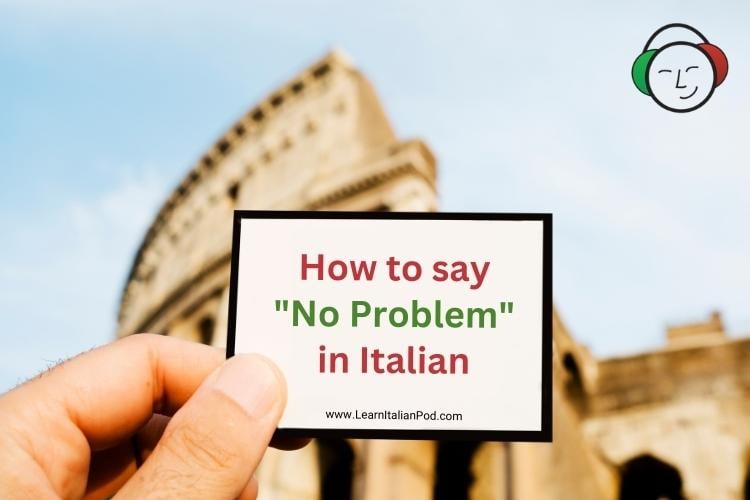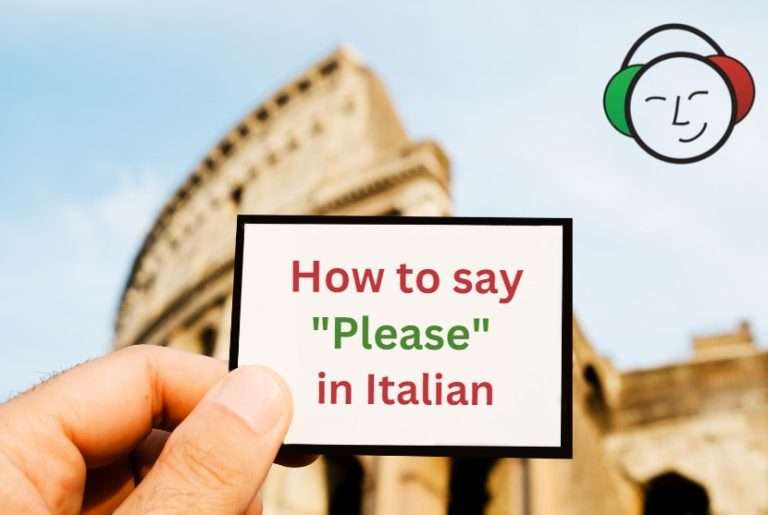How to Say No Problem in Italian: 7 Ways with Audio
Ciao, amici! Max here, your Italian language aficionado. Today, let’s find out how to say no problem in Italian. In Italian culture, “no problem” is a versatile phrase used when someone apologizes and when expressing that a favor is not inconvenient.
Imagine walking in Rome, and a native speaker accidentally bumps into you. They apologize, and you respond with “No problem!” (in Italian) to reassure them.
Similarly, when thanked for a favor, instead of the usual “prego” (you’re welcome), you might want to convey that the favor was no trouble at all, adding depth to your response and reflecting the subtleties of Italian social interactions.
How Do You Say No Problem in Italian?

In Italy, “Non c’è problema” and “Nessun problema” are the two most commonly heard phrases used to express “No problem,” effectively dismissing any issue. Just like English, the Italian language offers a variety of ways to convey this concept.
Other expressions, like “Figurati” (informal, Don’t mention it), “Si figuri” (formal, It’s nothing), “Non ti preoccupare” (Don’t worry), “Non fa niente” (It’s nothing), and “Non importa” (It doesn’t matter) offer a range of options to convey the sentiment of “no problem” in different contexts and levels of formality.
Let’s explore and learn the seven most common ways to say “no problem” in Italian.
1. Non C’è Problema: The Classic Response

“Non c’è problema” is a popular Italian expression, your go-to phrase to say “no problem” in Italian.
It conveys a relaxed attitude, akin to saying “everything is fine” or “there’s no issue.” It’s slightly more polite than “nessun problema” (next in our list) and literally means “there is no problem.”
“Non c’è problema” is also used positively as a response to someone’s gratitude. For example, when someone thanks you for a favor, you can answer with a friendly “Non c’è problema,” showing that you were happy to help.
| Italian | English |
|---|---|
| A: Grazie per avermi aiutato. B: Non c’è problema! | A: Thank you for helping me. B: No problem! |
Suggested Read: 47 Best Italian Sayings About Life
2. Nessun Problema: It’s All Good
“Nessun problema” is the direct translation for “no problem.” Used universally in both informal and formal contexts, it’s composed of the words “nessuno” (nobody, nothing) and “problema” (problem).
A key tip to remember is that “nessuno problema” is incorrect. Why, you ask? Because the word “nessuno” is shortened to “nessun” before masculine nouns starting with a consonant, except those beginning with gn-, ps-, x-, s-, or z. Hence, “nessun problema” is the correct usage in Italian grammar.
How to Pronounce Nessun Problema
The key to mastering the pronunciation of “nessun problema” is articulating every syllable. “Nessun” is pronounced as “neh-soon” while “problema” maintains the English pronunciation with a slight emphasis on the “o,” sounding more like “pro-ble-ma.”
| Italian | English |
|---|---|
| A: Scusa per il ritardo. B: Nessun problema! | A: Sorry for being late. B: No problem! |
3. Figurati: The Casual Twist

“Figurati,” a gem in Italian, adds a sprinkle of casual charm to your conversations.
This informal expression, translating to “Don’t mention it” or “It’s nothing,” is typically used among friends and in relaxed settings. It’s not just a response to gratitude; it often conveys a sense of ease and informality in various scenarios.
For instance, if someone apologizes for a small error or thanks you for a simple gesture, “Figurati” is your go-to phrase. It’s like saying, “Hey, no big deal!”
| Italian | English |
|---|---|
| A: Mi scuso per il disturbo. B: Figurati! | A: I apologize for the disturbance. B: Don’t mention it! |
Use “Figurati” to add a touch of Italian flair to your casual interactions, and watch how it transforms the mood into something more easy-going and friendly.
Suggested Read: How to Say I Love You in Italian
4. Si Figuri: Upping the Formality
“Si figuri,” the formal counterpart to the more casual “Figurati,” is an expression that brings elegance and respect to your Italian conversations. Perfect for interactions with elders or in formal settings, it conveys a sense of politeness and respect.
When someone expresses gratitude, especially in a more formal or respectful context, “Si figuri” is the way to go. It’s akin to saying, “Think nothing of it” in English, offering a graceful acknowledgment.
| Italian | English |
|---|---|
| A: La ringrazio per la sua pazienza. B: Si figuri! | A: I thank you for your patience. B: Think nothing of it! |
Employ “Si figuri” to say “no problem” in Italian with a touch of formality, and it will add a layer of cultural authenticity to your Italian conversations.
5. Non Ti Preoccupare: Don’t Sweat It

“Non ti preoccupare” is a heartfelt Italian expression that translates to “Don’t worry about it.” Embodying warmth and reassurance, it’s perfect for comforting your Italian friend who’s made a minor mistake or is concerned about something.
The phrase helps to alleviate worries and reinforces a supportive bond between people. Use “Non ti preoccupare” to spread a sense of ease and understanding in your interactions, making the conversation more empathetic and considerate.
| Italian | English |
|---|---|
| A: Mi dispiace per il ritardo. B: Non ti preoccupare. | A: Sorry for the delay. B: Don’t worry about it. |
Suggested Read: How to Say Good Luck in Italian
6. Non Fa Niente: It’s Nothing, Really
“Non fa niente,” an understated yet gracious phrase, translates to “It’s nothing” in English. It’s ideal for dismissing minor inconveniences or accidents, expressing that there’s no harm done.
This expression is perfect for casual, everyday situations where you want to reassure someone that everything is fine.
| Italian | English |
|---|---|
| A: Ieri ho dimenticato di chiamarti. B: Non fa niente. | A: I forgot to call you yesterday. B: It’s nothing. |
Use “Non fa niente” in situations where a simple, easy-going response is needed to brush off small issues.
7. Non Importa: It Doesn’t Matter

“Non importa,” conveying “It doesn’t matter” in English, is the Italian way of lightly dismissing something of little consequence. It’s the expression you’d use to brush off minor issues with a relaxed, carefree approach, signaling that the matter isn’t significant enough to warrant concern.
Use “Non importa” to maintain a laid-back atmosphere in conversations, especially when you want to keep things light and stress-free.
| Italian | English |
|---|---|
| A: Scusa, non ho portato il libro. B: Non importa. | A: Sorry, I didn’t bring the book. B: It doesn’t matter. |
So, there you have it, amici! You just learned seven ways to smoothly navigate social niceties in Italy. As you practice these phrases, remember language isn’t just about words; it’s about culture, connection, and the joy of sharing experiences.
Before You Go…
Ready to dive deeper into Italian culture after mastering “no problem”? Explore our Beginner Italian: How to Say category for easy-to-follow guides on essential phrases and pronunciation tips. Your journey to Italian fluency starts here.







